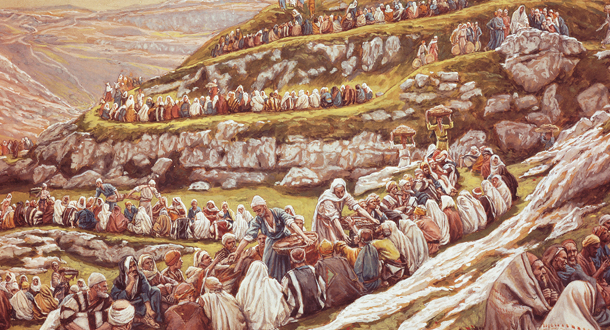 Scripture:
Scripture:
Reflection:
The gospel reading for today poses a strong challenge for followers of Jesus. His chronic opponents, the Pharisees, direct a question to Jesus: “Is it lawful for a husband to divorce his wife?” As Mark the evangelist notes, “they were testing him.” In fact, Jewish tradition, based on Deuteronomy 24:1-3, permitted a man to divorce his wife for certain conditions. The debate in Jesus’ day was not focused on whether there could be divorce and remarriage but on what were the circumstances justifying this step.
In his reply, Jesus refuses to get embroiled in such a discussion. Instead he recalls for his opponents the original intent of God who created man and woman out of love and desired that the union of husband and wife would be a permanent bond of love. Moses’ permission for divorce was a concession to human weakness. To drive his point home Jesus quotes from the creation account in Genesis and the ideal that a husband and wife would “become one flesh.” For Jesus, fidelity to God’s will was the driving force of his life and superseded all other considerations.
Jesus’ commitment to this vision of faithful and life-long mutual love of husband and wife was, in fact, part of his view of the human family as a whole. All of us were called to faithful love for each other; all were called to unlimited forgiveness, even of enemies; all of us were called to seek the good of the other—feeding the hungry, clothing the naked, consoling the sorrowful, seeking justice, making peace. Jesus’ teaching throughout the gospels affirms that an authentic human life is committed to respect and love for the other. How much more would be expected of a man and woman who vow love for each other in the intense bond of marriage?
Jesus’s beautiful and challenging understanding of the human capacity for love did not lead to a heartless rigor in the face of human frailty. Jesus’ own chosen disciples were evidence of this—they often failed to understand Jesus’ teaching, were prone to petty jealousies and arrogance, showed indifference to the needs of others, and, ultimately, abandoned Jesus out of fear when the threat of death approached. Jesus continued to love and forgive his disciples, even when they failed him.
This mix of breathtaking beauty and human frailty runs throughout the New Testament and remains a lesson for the church today. If anything, our modern social context is less supportive of marriage than the circumstances of traditional societies. The prevalence of divorce in modern western societies is high, including Christians as well. Pope Francis has encouraged bishops and pastors to continue to lift up the ideal of faithful and enduring married love while, at the same time, showing compassion, understanding, and respect for those who find themselves in difficult circumstances. His beautiful instruction on married life, “The Joy of Love,” reflects the enduring teaching of Jesus about marriage and, at the same time, invokes Jesus’ own merciful and compassionate love for us as we struggle to be faithful.
Fr. Donald Senior, C.P. is President Emeritus and Professor of New Testament at Catholic Theological Union. He lives at the Passionist residence in the Hyde Park neighborhood of Chicago.

 Scripture:
Scripture: Scripture:
Scripture: Scripture:
Scripture: Scripture:
Scripture: Scripture:
Scripture: Scripture:
Scripture: Scripture:
Scripture: